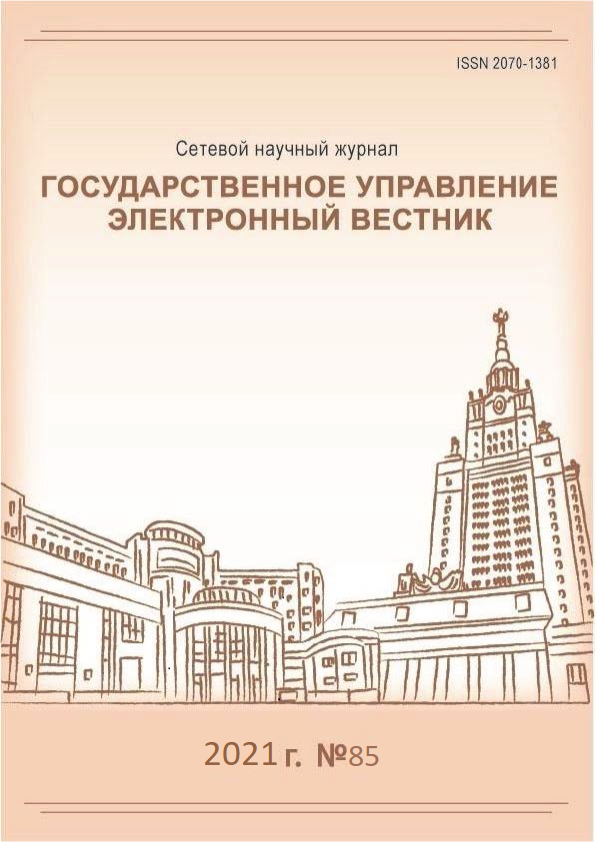Social Policy for Human Development: World Experience
Keywords:
Social policy, social services, human capital, guaranteed minimum income, social mobilityAbstract
In the period of global instability, the role of the state as a regulator of social relations and social support increases. The article analyzes complex socio-economic problems faced by modern Western states, that were formed even before the current coronavirus crisis and partially intensified by it: deepening of social stratification, the growth of unstable employment, wage and income inequality, the commercialization of the social sphere, changes in the parameters of poverty. It is concluded that in the course of searching for ways to partially compensate for losses and smooth out the negative effects of the socio-economic restrictions of COVID quarantine and its consequences, there was a request to change the forms of regulation of social relations and social support in favor of more universal models and expanding the scope of services that the state is called upon to provide citizens or actively participate in their organization. The system of social benefits, including their budget and insurance types, is unable to solve alone the whole range of problems faced by citizens who find themselves in an emergency situation. Economic unavailability of a whole range of services is the reason for the formation of a vicious circle of material dependence and social instability, leading to loss of human capital. The main attention is paid to considering such factors as ensuring sustainable social development of children, ensuring access to all levels of education, issues of medical and long-term social services for people in need of outside care. The key areas of state support that play an important role in ensuring social mobility, professional growth and improving the health status, such as housing security and access to high-quality public utilities, transport and digital services are also considered separately.
References
Григорьева Н.С. Социальная политика в России и мире: востребованность социального качества // Мир перемен. 2008. № 1. С. 82–95.
Чубарова Т.В., Шарова М.А. Государственная политика как фактор, влияющий на развитие пандемии COVID-19: выводы для России // Государственное управление. Электронный вестник. 2020. № 83. С. 84–107. DOI: 10.24411/2070-1381-2020-10110.
Albertini M., Pavolini E. Unequal Inequalities: The Stratification of the Use of Formal Care Among Older Europeans // Journal of Gerontology. Series B. 2015. Vol. 72. Is. 3. P. 510–521. DOI: https://doi.org/10.1093/geronb/gbv038.
Balesta C., Tonkin R. Inequalities in Household Wealth Across OECD Countries: Evidence from the OECD Wealth Distribution Database // Statistics and Date Directorate Working Paper. 2018. No. 88. URL: https://www.oecd.org/officialdocuments/publicdisplaydocumentpdf/?cote=SDD/DOC(2018)1&docLanguage=En.
Baptista I., Marlier E. Fighting Homelessness and Housing Exclusion in Europa. A Study of National Policies. Brussels: European Commission, 2019.
Barr N. Economics of Welfare State. Oxford: Oxford University Press, 2012.
Browne J., Immervoll H. Mechanics of Replacing Benefit Systems with a Basic Income: Comparative Results from a Microstimulating Approach // IZA DP. 2017. No. 11192. URL: http://ftp.iza.org/dp11192.pdf.
Causa O., Hermanse M. Income Redistribution through Taxes and Transfers across OECD Countries // OECD Economic Department Working Papers. 2017. No. 1453. DOI: https://doi.org/10.1787/bc7569c6-en.
Hassler J., Moar J., Zeira J. Inequality and Mobility // Journal of Economic Growth. 2017. Vol. 12. P. 235–259.
Kolodziej I.W., Reichert A.R., Schmitz H. New Evidence on Employment Effects of Informal Care Provision in Europe // Health Services Research. 2018. Vol. 53. Is. 4. P. 2027–2046. DOI: 10.111/1475-6773.12840.
Korpi W., Ferrarini T., Englund S. Women’s Opportunities under Different Family Policy Constellations: Gender, Class and Inequality Tradeoffs in Western Countries Re-Examined Social Politics // International Studies in Gender, State and Society. 2013. Vol. 20. Is. 1. P. 1–40. DOI: https://doi.org/10.1093/sp/jxs028.
Marchal S., Kuypers S., Marx I., Verbist G. Singling Out the Truly Needy: The Role of Asset Testing in European Minimum Income Schemes // Euromod Working Paper. 2020. No. 04/2020. URL: https://www.econstor.eu/bitstream/10419/228403/1/1697309607.pdf.
Muir T. Measuring Social Protection for Long-Term Care // OECD Health Working Papers. 2017. No. 93. DOI: https://doi.org/10.1787/a411500a-en.
Olivetti C., Petrongolo B. The Economic Consequences of Family Policies: Lessons from a Century of Legislation in High-Income Countries // Journal of Economic Perspective. 2017. Vol. 31. Is. 1. P. 205–230. DOI: 10.1257/jep.31.1.205.
Pavolini E., Van Lancker W. The Matthew Effect in Childcare Use: A Matter of Policies or Preferences? // Journal of European Public Policy. 2018. Vol. 25. Is. 6. P. 878–893. DOI: https://doi.org/10.1080/13501763.2017.1401108.
Rouzet D., Sanchez A., Renault T., Roehn O. Fiscal Challenges and Inclusive Growth in Ageing Societies // Economic Policy Paper. 2019. No. 27. URL: https://ideas.repec.org/p/oec/ecoaab/27-en.html
Salvatory A., Manfredi T. Job Polarization and Middle Class: New Evidence on the Changing Relationship Between Skill Levels and Household Income Levels from 18 OECD Countries // OECD Social, Employment and Migrations Working Papers. 2019. No. 232. DOI: https://dx.doi.org/10.1787/4bf722db-en

